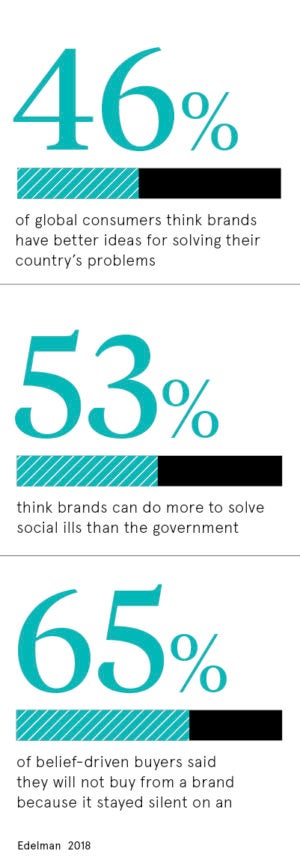It’s been two years since that misguidedly “woke” Pepsi campaign starring model Kendall Jenner aired and was swiftly pulled. Remember it? The junior member of the Kardashian clan seemingly ended a tense stand-off between protestors and police at what looked to be a Black Lives Matter rally by handing a can of Pepsi to a man in uniform The backlash was immense, leading to the resignation of the brains behind the campaign.
“Think of Pepsi and think of the damaging accusations of inauthenticity over its protest advert featuring Kendall Jenner,” says Chris Daly, chief executive of the Chartered Institute of Marketing (CIM). “Customers need to be convinced that the message is true and not just a marketing communication gimmick.”
Increasingly savvy and socially-conscious audiences don’t want to feel tricked, so it’s important to avoid “woke-washing”. That’s what political commentator Owen Jones recently called purpose-driven marketing gone wrong. He points to the Marks & Spencer LGBT sandwich as an “egregious” example, asking if the company “might consider selling the sandwiches in the stores it has proudly opened in gay-hating Saudi Arabia”.
Conscientious consumers increasingly putting pressure on brands
Tara Prabhakar, global qualitative director of the Insights Division at Kantar, says: “In the age of conscientious living, businesses are coming under increasing pressure from consumers to address broader societal issues. Some 84 per cent of centennials [those currently aged 19 to 35] expect companies to take a stand on social issues, according to research by Kantar.”
It’s worth thinking about the language used around campaigns in the media. For example, with climate change, the emphasis is often on what the average consumer can do to help. This messaging has helped Smart Energy GB with their smart meter campaign, says chief marketing officer Gavin Sheppard.
“What we have seen over the last few years is a permanent shift in consumer expectations and motivations,” he says. “Five years ago, the environmental credentials of smart meters were not a major motivator in product adoption; now we see them as being right up at the top of that list.”
How Gillette learnt from their first “woke” marketing misstep
 For a company not already seen as woke, or alert to social injustice, some trial and error might be involved. “The recent furore over Gillette’s The Best Men Can Be campaign is one example,” says Ms Prabhakar. “While it is encouraging to see this brand championing a more progressive male attitude to women, the firm faced backlash for charging women more for the same product as men.”
For a company not already seen as woke, or alert to social injustice, some trial and error might be involved. “The recent furore over Gillette’s The Best Men Can Be campaign is one example,” says Ms Prabhakar. “While it is encouraging to see this brand championing a more progressive male attitude to women, the firm faced backlash for charging women more for the same product as men.”
By contrast, the company’s latest campaign, First Shave, the story of Samson, has had a much better reception. Watching Samson tell the story of how his first shave marks a major milestone in his gender transition is a compelling experience for the viewer. The inclusion of Samson’s father makes the message universal: men have been teaching their sons how to shave since time immemorial and any father would want to buy the best razor for his son.
“Well done @Gillette. This is absolutely beautiful. I can feel the love coming from that father,” said a moved viewer on Twitter. For members of the trans community watching, it’s a powerful moment in which they feel seen by the brand. One viewer tweeted: “As a black trans man who works in advertising, this is everything. This is the kind of work I dream of creating some day.”
Are we reaching saturation for “purpose-driven” marketing?
Will consumers tire of firms competing to show off woke values? “I do not see saturation as a problem,” says Ms Prabhakar, “because purpose is not only about what you say. Unlike advertising, purpose is about tangibly improving people’s lives and, ultimately, communities and society itself. And the more choices consumers have when it comes to make responsible purchases can only be a good thing.”
There’s a danger, though, that today’s cutting-edge woke campaign will become tomorrow’s normal. Ms Prabhakar adds: “I do see differentiation as a challenge. Carlsberg’s groundbreaking sustainability innovations made it one of the first brewers to lose the plastic ring can holders on multipacks. Although this may be unique now, it’s only a matter of time before other players will follow.”
Where does purpose-driven marketing go from here? “Consumers will become increasingly sophisticated at sorting the wheat from the chaff,” says Smart Energy GB’s Mr Sheppard. “Be honest and open with consumers about the areas in which you want to do better.”
CIM’s Mr Daly concludes: “Consumers are empowered with more information on brands’ credentials than ever before. The retail and online landscape is moving control further into consumers’ hands, so transparency and trust are key. Brands must be up front about successes and failures alike.”
Conscientious consumers increasingly putting pressure on brands
How Gillette learnt from their first "woke" marketing misstep

